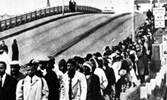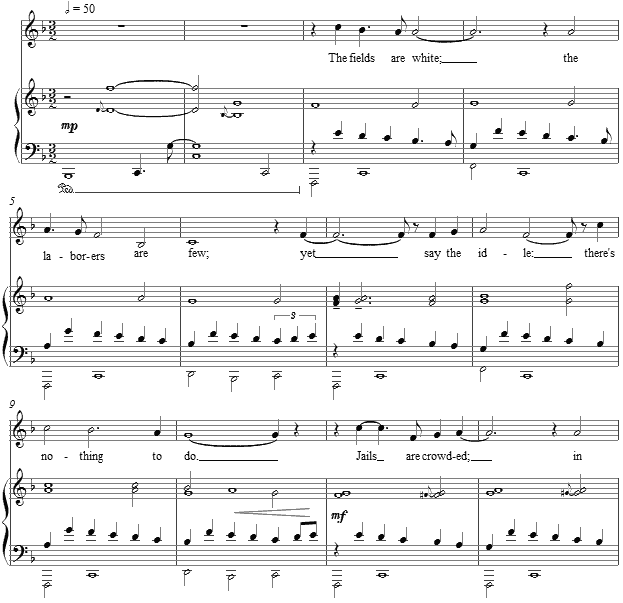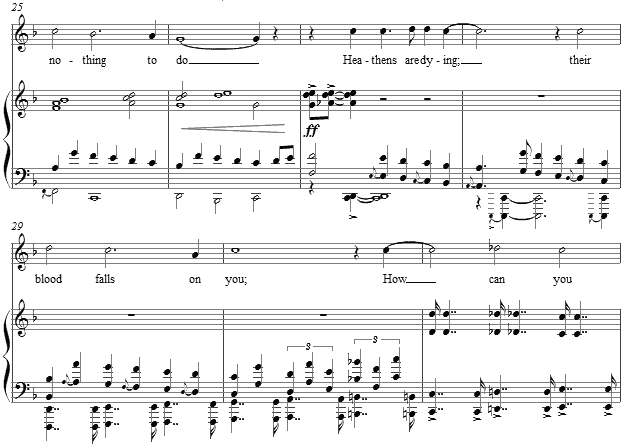Music and Texts of GARY BACHLUND
Vocal Music | Piano | Organ | Chamber Music | Orchestral | Articles and Commentary | Poems and Stories | Miscellany | FAQs
Nothing to Do - (2008)
James Ephraim McGirt
for high voice and piano
The fields are white;
The laborers are few;
Yet say the idle:
There's nothing to do.
Jails are crowded;
In Sunday-schools few;
We still complain:
There's nothing to do.
Drunkards are dying --
Your sons, it is true;
Mothers' arms folded
With nothing to do.
Heathens are dying;
Their blood falls on you;
How can you people
Find nothing to do?
[ 3 pages, circa 2' 20" ]
From the coverage of black leaders from the Southern Christian Leadership Conference
and Student Nonviolent Coordinating Committee as they lead the march down
from the Edmund Pettus bridge towards the waiting state troopers.
Without a photo to offer of black American poet James Ephraim McGirt, I chose to illustrate this poem's sense with a visual recollection from the civil rights movement in Selma and Montgomery, Alabama.
What is interesting to note is that decades of public protest and advancement in civil rights in the United States has left both advancement in some areas and yet decay in others. One modern web site -- blackgenocide.org -- notes "the disproportionate number of black babies exterminated by the abortion, while another notes "Black American women comprise 13.5 % of the female population in the U.S. but have 34% of all the abortions. Black abortion rates are approximately 2.6 times higher than the white" -- blackelectorate.com. The civil rights activists' stance today ignores as politically incorrect black on black crime ("jails are crowded") and the undue excess of abortions among black Americans ("their blood falls on you"), while James McGirt foresaw these kinds of issues in 1899, the date of the poem above. McGirt's question still resounds: "How can you people find nothing to do?" The challenge is as valid today as it was a century ago, as today's civil rights activists cleverly avoid the substantial issues which affect not only the black American community, but in a larger sense humankind across the world.
James Ephraim McGirt (1874-1930) was an author, publisher and prosperous business man. McGirt came from rural Robeson County, North Carolina. He began writing while he lived and attended school in Greensboro, writing poetry and earning his bachelor's degree at Bennett College in just three years in 1895. His first volume of poetry, Avenging the Maine, was published in 1899 by Edwards and Broughton. Later volumes of poetry were Some Simple Songs, For Your Sweet Sake, and The Triumphs of Ephraim. In Philadelphia, he founded McGirt's Magazine, an illustrated monthly denouncing color prejudice and urging positive race advancement for American blacks along with his own and other prominent black Americans' writings. The magazine flourished for about six years, but closed in 1909, after which McGirt returned to Greensboro and established several businesses. Alcoholism marred the end of his life, and he died from nephritis.
McGirt begins with the image of fields "white" which might well refer to cotton fields beckoning laborers to work. As hard as such an image is in its reference to slavery before the Civil War, many antebellum freemen became farm laborers and share croppers. Certainly we know from McGirt's experience with this could have been personal, for he was born into a rural economy. From this first image of few laborers for a mighty work, McGirt accelerates his images, beginning with jail opposed to Sunday-school, and then to substance abuse addicts dying, and finally "heathens" dying by which McGirt means those not informed by and living according to the tenets of religion such as he would have known it.
The setting begins gently with a falling line to juxtapose against the theme above. Each increase in dynamics and wrong-note dissonance heightens the point of this text.
The final stanza of the poem becomes a forceful challenge, as the theme is underpinned by aggressive octaves and double dotted rhythms.
The score for Nothing to Do is available as a free PDF download, though any major commercial performance or recording of the work is prohibited without prior arrangement with the composer. Click on the graphic below for this piano-vocal score.


